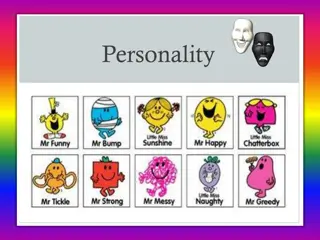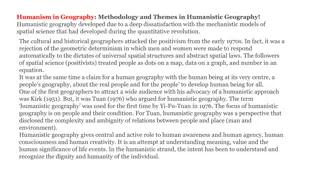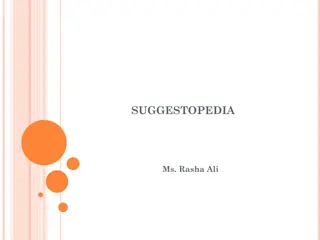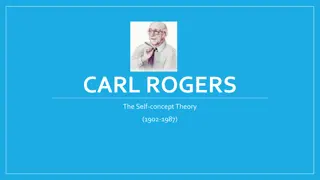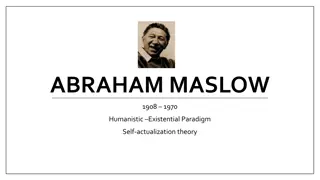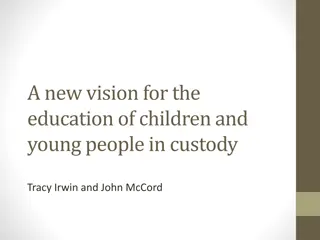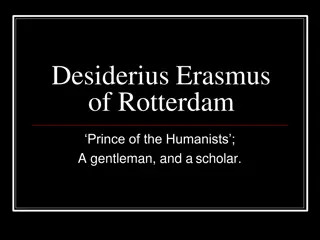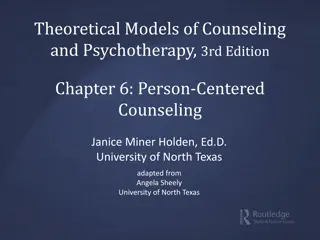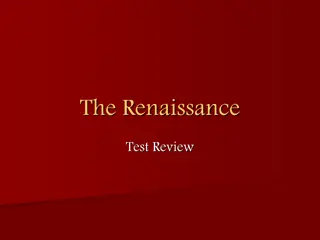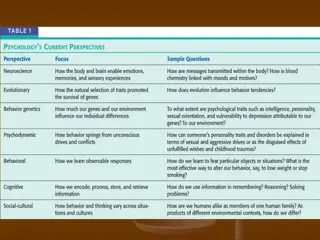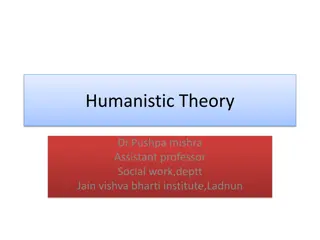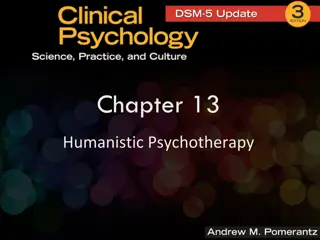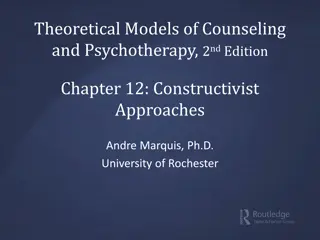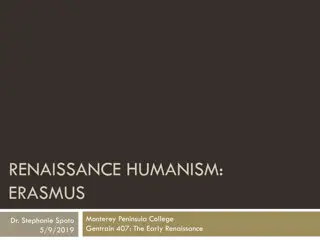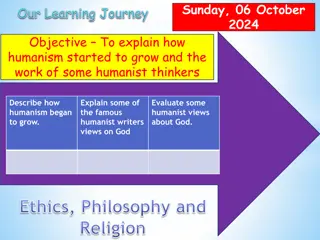Outcomes Research
Explore the definition and importance of outcomes research in managed care, including the tools used to measure clinical, economic, and humanistic outcomes. Discover the role of managed care pharmacists in outcomes research.
3 views • 20 slides
Understanding Personality: Theories, Types, and Assessment
Exploring the intricate world of personality, this comprehensive guide delves into major theories of personality development, assessment methods, cultural influences, and key contributors. Discover the different types of personalities, including Type A and Type B, and unravel the complexities of psy
0 views • 96 slides
Understanding Personality: Theories and Components Explained
Personality is the unique and enduring characteristics that define individuals, influencing their behavior consistently over time. Explore the origins of personality from the Latin word 'persona' meaning 'mask', and delve into major perspectives such as psychoanalytic, trait, humanistic, and social-
1 views • 45 slides
Understanding Maslow's Hierarchy of Needs in Humanistic Psychology
Humanistic psychologists, such as Abraham Maslow and Carl Rogers, viewed personality as a quest for self-determination and self-realization. Maslow's hierarchy of needs illustrates how individuals progress from fulfilling basic physiological needs to achieving self-actualization and self-transcenden
0 views • 25 slides
Humanism in Geography: Methodology and Themes
Humanistic geography emerged as a critique of mechanistic spatial models during the quantitative revolution, emphasizing human agency, consciousness, and creativity in understanding the complexities of human-place relationships. It rejects geometric determinism and celebrates individual dignity, pro
0 views • 4 slides
Understanding Suggestopedia: A Humanistic Approach to Language Learning
Suggestopedia, an affective-humanistic approach to language learning, aims to eliminate negative feelings towards studying and boost students' confidence. By incorporating elements like posters, encouraging interactions, music, and student participation, this method emphasizes the teacher's authorit
0 views • 9 slides
Carl Rogers and the Self-Concept Theory
Carl Rogers, a prominent figure in personality theory, emphasized individuals' constructive potential and the impact of their subjective experiences on personality development. He viewed individuals as goal-directed and capable of change, with the environment playing a facilitating or inhibiting rol
1 views • 78 slides
Understanding Abraham Maslow's Humanistic Existential Paradigm
Explore the key concepts of Abraham Maslow's humanistic existential paradigm, including self-actualization theory, perspective, and views on need gratification. Learn about Maslow's belief in human potential, the motive for self-actualization, and the importance of need gratification in realizing in
1 views • 81 slides
Understanding Conflict Management: Key Perspectives and Approaches
Explore the multifaceted realm of conflict management through the lenses of traditional, humanistic, and interactionistic views. Delve into the definition, nature, and implications of conflict, and assess varying opinions on confrontation, communication, and resolution strategies within organization
0 views • 31 slides
Unveiling Positive Psychology: Shifting Focus from Weakness to Strength
Delve into the evolution and principles of positive psychology, which emerged as a reaction to traditional approaches focusing on weaknesses. Learn about its roots in humanistic psychology, and the shift towards a more holistic and strengths-based perspective. Explore how positive psychology advocat
7 views • 19 slides
Transforming Education for Young People in Custody: A New Vision
Rethinking the traditional prison education system for young people in custody, Tracy Irwin and John McCord propose a humanistic approach with self-directed and experiential learning to address literacy challenges, mental health issues, and negative learning identities. The new vision includes offen
0 views • 11 slides
Life and Legacy of Desiderius Erasmus of Rotterdam
Desiderius Erasmus, a Dutch philosopher and scholar, was a pivotal figure in the humanist movement of the Renaissance. Born in Rotterdam in 1460, Erasmus advocated for unrestricted learning, church reform, and intellectual independence. His works, such as "In Praise of Folly," left a lasting impact
0 views • 7 slides
Person-Centered Counseling: A Historical and Philosophical Overview
Person-Centered Counseling, pioneered by Carl Rogers, is grounded in humanistic principles such as actualizing tendency, awareness, and existential concepts. This approach emphasizes the innate potential for growth and self-actualization within individuals, focusing on creating a supportive and nonj
0 views • 20 slides
Unveiling the Renaissance: A Journey of Rebirth and Humanism
Explore the transformative era of the Renaissance, a period of rebirth, flourishing art, literature, and humanistic revival after the dark Middle Ages. Discover how individuals embraced humanism, literacy thrived with the printing press invention, and the beauty of classical works was rekindled, sha
0 views • 11 slides
Understanding the 7 Approaches in Psychology: Applied in the Case of Andrea Yates
Explore how the 7 psychological approaches - psychological, cognitive, behavioral, humanistic, biological, sociocultural, and evolutionary - can help analyze the complex case of Andrea Yates, who tragically murdered her children, delving into factors like postpartum depression, brain chemistry, fami
0 views • 12 slides
The Life and Works of Edmund Spenser (1552-1599)
Edmund Spenser, born in London around 1552, was a prominent English poet known for works such as "The Faerie Queene" and "The Shepheardes Calender." His contributions to English literature reflected religious, humanistic, and nationalistic ideals. Despite facing personal challenges, Spenser's poetic
0 views • 13 slides
Understanding Humanistic Theory of Personality and its Key Concepts
Humanistic theory emphasizes the active role individuals play in their behavior, with proponents like Abraham Maslow and Carl Rogers. It focuses on humanistic psychology, existentialism, and humanism, emphasizing personal meaning and values. The theory argues for the innate goodness of individuals a
0 views • 8 slides
Understanding Humanistic Psychotherapy: Core Concepts and Goals
Humanistic psychotherapy, led by figures like Carl Rogers and Abraham Maslow, emphasizes self-actualization and positive regard in therapy. The goal is to foster natural growth and wellness by promoting congruence between real and ideal selves. Essential therapeutic conditions include empathy, uncon
0 views • 15 slides
Constructivist Approaches in Counseling and Psychotherapy: A Philosophical Perspective
Constructivist approaches in counseling and psychotherapy emphasize the ongoing process of structuring experiences to create meaning. This perspective involves philosophical underpinnings from thinkers such as the Buddha, Immanuel Kant, and Jean Piaget, highlighting the role of individual constructi
0 views • 35 slides
Erasmus: Prince of Humanism and Renaissance Scholar
Explore the life and contributions of Erasmus, a prominent Christian humanist of the Northern Renaissance. Known for his scholarly works, Erasmus played a vital role in the revival of classical learning and the development of humanistic thought in Europe. His translations and philosophical reflectio
0 views • 12 slides
The Growth of Humanism: From Renaissance to Enlightenment
Humanism began to flourish during the Renaissance and the Enlightenment periods, challenging traditional religious beliefs and emphasizing the value of human reason, rights, and autonomy. Influential humanist thinkers questioned the authority of the Church, valued human creativity, and promoted indi
0 views • 26 slides
Rhetorical Approach to Translation Studies: Challenges and Perspectives
This study explores the emergence of a rhetorical approach in Translation Studies, aiming to counter empiricism and highlight the importance of subjectivity and interpretation in translation. By examining paradigms in Translation Studies, it contrasts the scientistic drive for objectivity with a hum
0 views • 34 slides
Understanding Personality: Theories and Perspectives
Personality is a dynamic psychological concept shaped by internal needs, cognitive processes, and external influences. Psychodynamic and humanistic theories offer insights into different aspects of personality, while clinical and social-cognitive perspectives contribute to our understanding. Freud's
0 views • 26 slides
Standing Strong in a Humanistic World
In Philippians chapter three, Paul warns against placing confidence in worldly achievements and emphasizes the importance of knowing Christ. He exhorts believers to focus on their citizenship in heaven and eagerly await the transformation by Jesus Christ. The prevailing humanistic narrative of socie
0 views • 46 slides

